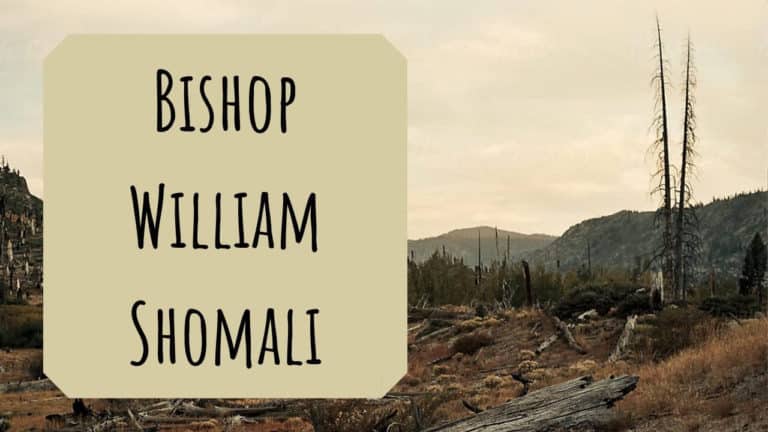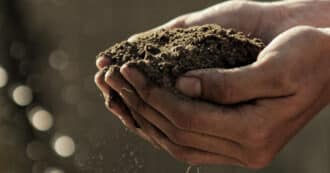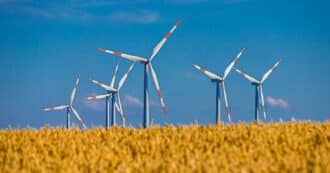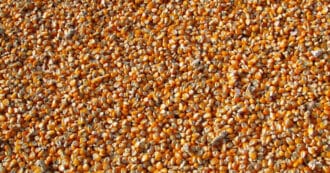Interviewed by Siiri Bigalke of The Interfaith Center for Sustainable Development and Recorded by Daniel Altman
The text below is the full transcription of the interview – a condensed version appears in the video above.
Transcription of the Interview with Bishop William Shomali
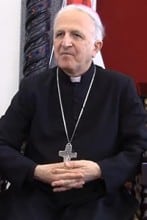
Bishop William Shomali: I’m Bishop William Shomali, Auxiliary Bishop for the Latin Patriarchate of Jerusalem. I’ve been living here [the Holy Land] for 35 years as Bishop. I’ve served in Jordan and Palestine all of my time.
Siiri: Please tell us about the origins of your personal concern for the environment and the ecological damage, including climate change, which society is inflicting upon the Earth.
Bishop William Shomali: I was initiated to the term environment, or ecology, slowly slowly, when I was student of the 6th grade, when our teacher of geography told us that the Amazon forest of Brazil are the lungs of the world. So this astonished me, how can a forest be a lung? So he explained that we need oxygen, that we produce everyday through factories, through technology carbon dioxide, which is polluting the air, so we need really to have fresh air, less pollution. So he explained to us the value of a forest. Then I heard about deforestation, when man cuts the trees in order to use them for furniture, etc. Then I also heard about the pollution of rivers, of seas, I heard of the Chernobyl atomic reactor in Russia, exploded, or emitted radioactivity. So all these things together educated me to the importance of protecting the creation, to protect the world in which we live so that we can breathe fresh air, drink clean water – this is important. And to have also healthy food. Our life is related to the creation, through the air, the food, the water, etc. And slowly, slowly, I came to the knowledge of the importance of protecting the creation before it is too late.
Siiri: In terms of your own personal religious practice, how does environmental sustainability factor in?
Bishop William Shomali: At the same time, I’m a believer and a human being. As a believer, I relate to God. As a human being I relate to the society in which I believe. And there is no contradiction between being believer and human. We know from our faith that God created the world. And he created it perfect, harmonious, beautiful. And he wants us to keep it as stewards, for our own interests. If we keep creation, it’s our salvation. If we don’t keep it, it will be our own destruction as human beings. So to say the truth, according to me, to respect the creation, to fight pollution, is an act of faith. It is an ethical act related to religion. I can’t for example, accept that in Gaza, all the sewage goes to the Mediterranean. Because the Mediterranean is polluted, and the Mediterranean belongs to all the people living around it. So this pollution, according to me, is a crime. We have to fight any form of pollution, not only in our own country, but in other countries because of the interaction in between different places in the world. So really it became a problem for all religions together but also an international problem.
Siiri: Can you elaborate on a teaching the Bible that relates to protecting the environment?
Bishop William Shomali: We find in the Bible, many teachings related to the creation, to the environment. From the first chapter of Genesis, we know that the Lord created the Earth, created light, created water, created animals, plants, trees, and everything was beautiful says Genesis. And the Lord found that everything was nice. It means that the book of Genesis is optimistic about the creation. It’s a good thing. It came perfectly from the hands of the Lord. And then I observed that in the Psalms, we have many texts that speak about the beauty of the creation. The Lord created the world very beautifully so that we can enjoy it. We can enjoy a sunset, we can enjoy a beautiful scenery of hills, mountains, waters, oceans, etc. Psalm 104 is related to this, the verse 24 reads, “Oh Lord, how wonderful are your works. In wisdom you have made them all. The Earth is full of your riches. The glory of the Lord shall endure forever. The Lord shall rejoice in his works.” It’s a beautiful Psalm. All whole Psalm is like this. So really, when we protect the creation, we give praise to the creator himself. Who has done things very well. We find also other Psalms speaking about the beauty of the world, and how the wise Lord has done things very good for our own advantage. Even to teach to students in the school, because through poetry, people can learn ecology – how to respect the beauty, the harmony of the creation.
Siiri: Do you think that people in positions of leadership in religious institutions, like yourself, can influence the way communities address climate change or other environmental issues – energy, greenhouse gases.
Bishop William Shomali: Yes, we need to collaborate together between Christians, Muslims, Jews, Buddhists, Hindus – any religions. Because it is a common problem related to all of us. Collaboration is important. Not only between people of faith but also with politicians. We have also to educate politicians, and to tell them that protecting the environment is a duty, is a religious act – or let us say, a human act. What we can do as people of faith, as religious leaders, is to educate, to talk, to ensure the young generation the importance of fighting pollution for example. I give you an example, many times a fire in a forest starts by neglect – because someone has created a fire for a barbeque and they left the dire un-extinguished and they left. What can we call this? It’s a crime. They enjoyed it and they left. What happened after they left? A fire in a forest. Maybe people can die fighting the fire, and the destruction it can’t be repaired quickly. So really, to give a sense of duty to the young people, how they should respect the forest, a tree, a flower – even in simple things: how to respect the water. We as people of faith, we have to teach people to respect water, not to waste water, because in other places people don’t have. So our work can go from simple things, from teach young generations, simple things: how to respect the environment. To more complicated things, for example, how to educate politicians how to find alternatives ways for energy. So our role is to talk, to educate, not only to young generations but to the people who are the decision makers. And slowly, slowly the world makes its way, and it touches the hearts, and there is progress. If we speak together as religious leaders, our impact is really stronger. So it’s our duty to speak even if what we say can be disturbing, but we have to talk, we have to talk.
Siiri: What do you see as the role of people of faith coming together to promote environmental sustainability? Why is this important?
Bishop William Shomali: I am sure that working together on ecology and the environment unites us. Because here there is no dogmatic difference, no ethical difference, we all agree that we have to respect the environment, the water, the sea, the river, the mountain, the gardens, the forests. I don’t see any exceptions to this rule. So really, I believe that even working together becomes the best way of inter-religious dialogue. Because what is the use and the advantage of inter-religious dialogue if it remains only on a theoretical level? Just to say “my religion says this, your religions says that”. Okay, we know this, we find it in the books. But if we can work for a noble cause, like ecology, really we feel we are more united. So I believe that ecology unites the religions, and the fighting against the pollution, for a better environment, unites religions. I admire the Bahá’í religion, which we find them in Haifa. When you got to visit their shrine, they have the most beautiful gardens in the country. It’s a good example how religions sustains harmony, beauty, aesthetics. I love this. If all religions behaved like them, fights for beauty, harmony, gardens, flowers, etc, it will educate people to a very important meaning in life.
This Conversation on Faith and Ecology was produced by the Interfaith Center for Sustainable Development (ICSD). Each conversation involves an interview with a religious figure on their perspective on their religion’s approach to ecological sustainability.
The aim of the initiative is twofold: firstly, to record the spiritual insight of religious and community leaders regarding sustainability, and secondly to ignite interfaith discussions regarding the nexus between spirituality and sustainability.

